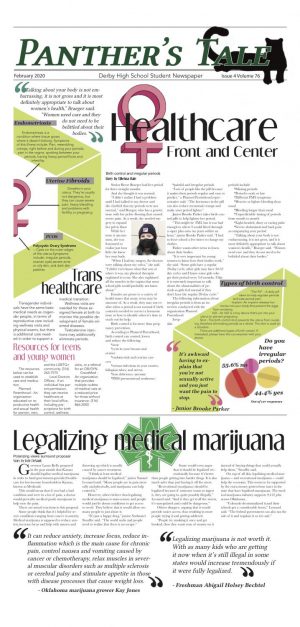Page 3: Behind the scenes: Mental health
February 24, 2021
Depression and anxiety, two words that can mean so much.
And that’s not even scratching the surface when it comes to mental illness.
Day-to-day simple tasks can turn into long, arduous battles.

“Today could be a good day but tomorrow would feel like the world is coming to an end,” senior Sidney Gore said. “On the good days I am very appreciative and make the most of it because I know tomorrow may not be the same. on the bad days I usually just feel numb and unmotivated but still put on a front so that people think I’m OK.”
Gore, who struggles with anxiety and depression, says that a typical day revolves around involuntary movements and worrying about the things to come.
Other forms of mental issues go under the radar.
For example, sophomore Christie Schroeder battles Post Traumatic Stress Disorder.
“Some days are definitely harder,” she said. “Loud noises and lots of people can sometimes send me into a sort of panic. But since school has kind of been less full of people because of COVID, I’ve had less of those experiences. I still get them sometimes, especially during lunch with the lines of people and everyone being in one central location.”
School is considered a trigger.
While at school, however, Schroeder finds ways to cope.
“I usually get myself out of the area that’s causing it and go some place quiet,” she said. “For example, if I’m in a classroom that is loud and it’s making me anxious, I go to the bathroom and then I usually do my 54321 breathing exercise and splash some cold water on my face. That usually helps and if it doesn’t then I just until I’m done having my episode.”
Because of how common mental health struggles are within teens, some views have become skewed.
“I think that a lot of adults just kind of push teenage mental health aside and label it as us ‘being dramatic because we are young.’ That’s what the majority of adults were told when they were our age, but I feel teens now are more open to the idea of mental health and things we can do about it,” Schroeder said.
For junior Hayley Vidales, it depends on the person as to whether they understand mental health.
“I would say it depends on the adult, because some completely understand but others just continue to ignore it,” Vidales said. “It’s just the way they grew up, especially Gen X and boomers (Baby Boomers). They were told to keep it down and not acknowledge it.”
It can mean a whole lot to someone by just saying hi when passing in the hallway. It can be the difference between them having a good day or a bad day.
“ ‘Mental health’ means to treat everyone like they are having a bad day. every interaction you have with someone affects them in some way, but you choose whether that’s positive or negative,” Gore said.







